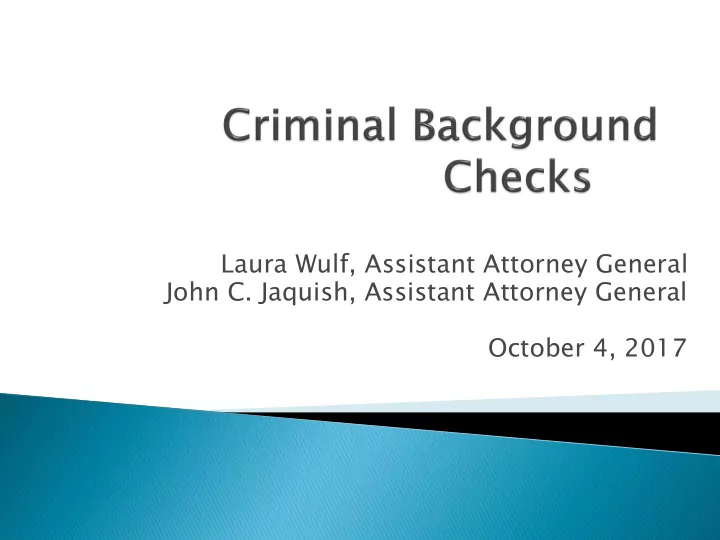

Laura Wulf, Assistant Attorney General John C. Jaquish, Assistant Attorney General October 4, 2017
TOPICS TO BE COVERED What is the statutory authority for doing CBC’s? Permissible v. Mandatory What are the different kinds of checks? Potential pitfalls of collecting CBC data Climate regarding CBC’s in Washington
PERMISSIBLE CRIMINAL BACKGROUND CHECKS (2) [a] person may be denied employment by the state of Washington . . . by reason of a prior conviction of a felony if the felony for which he or she was convicted directly relates to the position of employment sought . . . and the time elapsed since the conviction is less than ten years. RCW 9.96A.020(2), emphasis added.
MANDATORY CRIMINAL BACKGROUND CHECKS Washington law requires a criminal background check if a prospective employee “will or may have unsupervised access to children under sixteen years of age or developmentally disabled persons or vulnerable adults during the course of his or her employment or involvement with the business or organization.” RCW 43.43.830(2)(a).
DSHS is required to deny employment to individuals who have unsupervised access to children and vulnerable adults and who have been convicted of certain crimes or subject to findings of abuse or neglect of a child or vulnerable adult. RCW 43.43. The procedures for inquiring about and reviewing background checks for these types of “covered positions” are found in the DSHS “Guidelines for Conducting Employee Background Checks.”
IRS Requirements For Criminal Background Checks Increasingly IRS has begun to require criminal background checks for employees who have access to confidential information provided by the IRS. Agencies affected have included DSHS, DOR, and ESD. OFM has requested legislation to provide agencies with authorization to require these criminal background checks.
SOURCES FOR CBC’s Washington State Patrol Washington Access To Criminal History Reports “WATCH” use SSN’s, DOB, DL, names and aliases. Generally only provide conviction data not other information e.g. arrests FBI Use fingerprints to search the national crime information center interstate identification index. Must have statutory authority.
Avoiding Potential Pitfalls of Collecting CBC Information Under Title VII of the Civil Rights Act of 1964 it is unlawful to discriminate in employment based on race, color, religion, national origin, or sex. 42 U.S.C. § 2000e et seq . According to the EEOC, national data supports a finding that criminal record exclusions have a disparate impact based on race and national origin. Therefore, caution is required to avoid disparate treatment and/or disparate impact when using background checks. Of particular concern are automatic disqualifiers. EEOC Enforcement Guidance, Number 915.002, at 1. The full text of the guidance can be found online at http://www.eeoc.gov/laws/guidance/u pload/arrest_conviction.pdf.
EEOC Guidelines The EEOC offers the following best practices for employers to follow when utilizing criminal history information in employment decisions: Eliminate blanket policies or practices that exclude individuals from employment based on having any criminal record, unless required by state or federal law. Develop a Policy. Limit Inquiries about criminal records. Keep information about applicants’ and employees’ criminal records confidential.
Current Considerations “Ban the box” legislation - passed in other states but not proposed legislation in Washington. Certificate of Restoration Opportunity (“CROP”) Legislation passed in 2015 in Washington - “ the legislature finds that employment is a key factor to the successful reintegration to society of people with criminal histories, and is critical to reducing recidivism, promoting public safety, and encouraging personal responsibility .” The Governor has also asked state agencies to find ways to help facilitate “increased state employment opportunities .” Executive Order 16 - 05 “Building Safe and Strong Communities Through Successful Reentry.”
Develop a narrowly tailored written policy and procedures for screening applicants and employees for criminal conduct. Identify essential job requirements and the actual circumstances under which the jobs are performed. Determine the specific offenses that may demonstrate unfitness for performing such jobs. Determine the duration of exclusions for criminal conduct based on all available evidence.
Include an individualized assessment for targeted screens. Document the justification for the policy and procedures (and keep records on file). Note and keep a record of consultations and research considered if crafting policy and procedures. Train managers, hiring officials, and decision-makers on how to implement the policy and procedures consistent with Title VII.
Recommend
More recommend